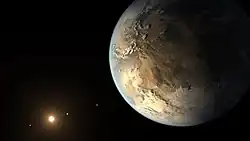Wikiphilosophers/Extraterrestrial life/S. Perquin

There are an estimated trillions of planets in the universe, billions of which would be in the habitable zone. According to current understanding, there should be at least 10 billion habitable planets in our galaxy alone. The probability of there being any form of life on such planets is logically enormous. After all, life also originated on our planet, which means that life should be able to develop on other planets, provided the living conditions are beneficial. The probability of very primitive extraterrestrial life should be many times greater than the probability of very advanced intelligent extraterrestrial life, since world disasters would thwart the overall development of life species.
However, this should not mean that the probability of highly advanced intelligent extraterrestrial life does not exist. On the contrary, there should theoretically be only one form of highly advanced intelligent extraterrestrial life, wherever it is in the universe, that could detect us. For once they would have solved all the mysteries of the universe and could manipulate and shape the universe, they would in fact have all possible knowledge and power over everything within the universe.
